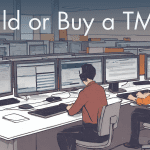
What to consider when upgrading your transportation management system
Bannockburn, Ill. – In the fast-paced world of logistics and transportation, staying ahead of the curve is not just a goal—it’s a necessity. Whether you’re a freight broker, shipper, carrier, or part of a third-party logistics company, the secret to unlocking operational efficiency and maximizing profits lies in embracing the right technologies. At the heart of this logistics tech revolution is the Transportation Management System (TMS).
Understanding the Importance of a TMS
Imagine orchestrating a symphony without a conductor – chaos, missed cues, and inefficiency would prevail. Similarly, in the logistics industry, the TMS acts as the conductor: harmonizing the complex movements of freight, carriers, and shipments. Its significance cannot be overstated.
Efficient Operations
A TMS streamlines the entire transportation process, optimizing routes, minimizing costs, and ensuring timely deliveries. From freight consolidation to real-time tracking, every facet of logistics is synchronized for peak performance.
Cost Reduction
Every penny counts, and a transportation management system provides a roadmap to cost reduction. It identifies the most economical routes, optimizes carrier selection, and eliminates inefficiencies, contributing to the bottom line.
Visibility and Transparency
For freight brokers, shippers, carriers, and 3PLs, visibility is the name of the game. TMS providers should offer tracking, giving stakeholders a bird’s eye view of shipments, improving communication, and instilling confidence.
Compliance Assurance
Navigating the regulatory landscape can be a daunting task, but a TMS ensures compliance with transportation regulations, permits, and documentation. Say goodbye to regulatory headaches and hello to smoother operations.
The Need for Technology in the Logistics Industry
The logistics industry is evolving from manual record-keeping and paper trails to a digital era where technology reigns supreme. Embracing technology isn’t just a trend; it’s a survival strategy. Here’s why:
Data-Driven Decision Making
In an industry inundated with data, the ability to transform it into actionable insights is a game-changer. Transportation Management Providers need to do just that, empowering logistics professionals to make informed decisions based on real-time data.
Improved Efficiency
Time is money, and technology is the accelerator. Automation features in transportation management systems speed up mundane tasks, allowing logistics companies to focus on strategic planning and relationship-building.
Customer Expectations
In an era of instant gratification, customer expectations are higher than ever. Technology, particularly TMS, helps meet these expectations by ensuring on-time deliveries, accurate tracking, and streamlined communication.
Competitive Edge
In a competitive landscape, those who harness the power of technology gain a significant edge. TMS isn’t just a tool; it’s a strategic asset that propels logistics companies ahead of the competition.
Customer Relationship Management
Having a CRM integrated with a TMS elevates the system overall. Users are able to closely track customers through sales, marketing, and other channels. Additionally, a CRM provides an avenue for stronger connections within the logistics and transportation industry.
The Basics of a Transportation Management System
Now that we’ve established the importance of TMS and the broader need for technology in logistics, let’s delve into the basics of what makes a transportation management system tick.
Route Optimization
At its core, TMS is a master navigator. It takes into account variables like distance, fuel efficiency, and delivery constraints to optimize routes, ensuring goods reach their destination swiftly and economically.
Carrier Management
Think of TMS as a matchmaker for freight and carriers. It facilitates the selection and management of carriers based on factors like cost, reliability, and performance. It’s not just about finding a carrier; it’s about finding the right one.
Real-Time Visibility
In a world where information is power, a TMS provides real-time visibility into the entire transportation process. From order processing to shipment tracking, stakeholders can access crucial information at their fingertips.
Analytics and Reporting
Data is the backbone of informed decision-making. TMS doesn’t just collect data; it transforms it into meaningful insights. Analytics and reporting tools help logistics professionals assess performance, identify bottlenecks, and drive continuous improvement.
Integration Capabilities
Even though a TMS should be a one-stop shop, it doesn’t operate in isolation. Seamless integration with other systems like ERP, WMS, and CRM ensures a complete and connected approach to logistics. It’s about breaking down silos and building collaboration.
In conclusion, the adoption of a Transportation Management System is not just a technological upgrade; it’s a strategic move towards a more efficient, cost-effective, and customer-centric logistics operation. Whether you’re a freight broker, shipper, carrier, or part of a 3PL, the time to embrace the transformative power of TMS is now. In an industry where every second counts, TMS isn’t just a tool – it’s the conductor orchestrating a logistics symphony of precision and excellence. The future of logistics is here, and it’s driven by technology.




